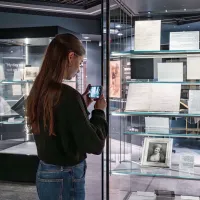About this course
Develop your passion and enhance your understanding of the past with a master’s in History at the University of Southampton. You'll learn of the great variety of history, develop explanations of the patterns that shaped the world, and examine wider perspectives across the past.
This flexible MA programme will engage you with leading researchers in a variety fields, from the Ancient world to the 'war on terror'. You can choose to study history from across the world, including Britain, continental Europe, North America, Africa and Asia.
You'll learn to study new themes, interrogate sources, debate interpretations and share in the fascination we have with the documented past. You'll have the chance to explore history from a wide range of perspectives including:
- ordinary life
- varying identities
- empires
- ethnicity
- class
- gender
- age
- faith
At Southampton, you can choose how to investigate the past. You'll have access to research seminars to develop your expertise in areas that interest you, and undertake research projects to further your understanding. We'll encourage you to consider different genres of history and the public communication of historical ideas, and develop your skills with our library and archive collections.
Flexible study
If you prefer, you can apply to study this course as:
Your modules and fees may vary if you choose a different study option.
We regularly review our courses to ensure and improve quality. This course may be revised as a result of this. Any revision will be balanced against the requirement that the student should receive the educational service expected. Find out why, when, and how we might make changes.
Our courses are regulated in England by the Office for Students (OfS).
Course lead
Your course leader is Dr Nicholas Karn. Visit Dr Karn's profile to learn more about his work.
Learn more about this subject area

The history department being small, allows students to form relationships with academics throughout their time here. I’ve found that to be my greatest asset studying here.

I was given funding through an opportunity offered by the University to travel to Ireland. It brought to life a lot of the things I had studied. It was an unforgettable experience and reminded me why I love my subject.

The thing I enjoy most about my course is my freedom of study. I love being able to choose my own research projects and tailoring the course to my specific interests.
Course location
This course is based at Avenue.
Awarding body
This qualification is awarded by the University of Southampton.
Download the Course Description Document
The Course Description Document details your course overview, your course structure and how your course is taught and assessed.
Entry requirements
You’ll need a 2:2 degree in history or a related subject.
Find the equivalent international qualifications for your country.
English language requirements
If English is not your first language, you must show that you can use English to the level we require. Visit our English language pages to find out which qualifications we accept and how you can meet our requirements.
If you are taking the International English Language Testing System (IELTS), you must get at least the following scores:
IELTS score requirements
- overall score
- 6.5
- reading
- 6.0
- writing
- 6.0
- speaking
- 6.0
- listening
- 6.0
If you do not meet the English language requirements through a test or qualification, you may be able to meet them by completing one of our pre-sessional English programmes before you start your course.
Pre-masters
If you don’t meet direct entry requirements, you can apply to complete a Pre-Master's programme through our partnership with OnCampus.
You'll progress to your chosen course after successfully completing the programme. Find out more about Pre-Master's programmes for international students.
Recognition of professional experience
If you don't have the exact entry requirements, but you have significant work experience in this sector we’ll assess your relevant professional experience, your subject knowledge and your aptitude for learning.
Your application will be considered on individual merit and you may be asked to attend an interview.
Got a question?
Please contact us if you're not sure you have the right experience or qualifications to get onto this course.
Email: enquiries@southampton.ac.uk
Tel: +44(0)23 8059 5000
Course structure
This is a full-time master’s course. You’ll study for 12 months, from September to the following September.
In the first 9 months (semesters 1 and 2) you’ll study the taught part of your course.
This is made up of modules that everyone on the course takes, and modules we’ll ask you to choose from a list of options. You’ll also study research skills to prepare for your dissertation.
For the last 3 months, over the summer, you’ll work independently to research and write your dissertation. You’ll have one-to-one meetings with your supervisor during this time to discuss your progress.
Want more detail? See all the modules in the course.
Modules
The modules outlined provide examples of what you can expect to learn on this degree course based on recent academic teaching. As a research-led University, we undertake a continuous review of our course to ensure quality enhancement and to manage our resources. The precise modules available to you in future years may vary depending on staff availability and research interests, new topics of study, timetabling and student demand. Find out why, when and how we might make changes.
For entry in academic year 2026 to 2027
Year 1 modules
You must study the following modules :
Critical Histories
This core module provides students with an opportunity to engage with a variety of methodologies and themes at MA level, including those they may be less familiar with, such as oral history and the history of memory, and cultural history and the history o...
MA History Dissertation
The culmination of your Masters’ degree, this module will provide you with the opportunity to convert your learning into a 12000 word dissertation on a historical research topic of your choice, subject to available supervisory expertise. Your final disser...
Public History
In this core module, students engage with public history as it is currently practised across the heritage and education sectors. The module considers the roles of museums and other heritage sites within society, and the challenges associated with producin...
You must also choose from the following modules :
Ancient Worlds and Modern Meanings: The Mediterranean and Beyond
Ancient history covers a vast geographical and chronological span, from Ancient Egypt to Classical Greece, from Rome to Imperial China, and from the Mediterranean into Europe, Africa, and the Near East. This module allows you to explore your interest in t...
Memory in National and Transnational Contexts
Whether in the form of monuments, stories or rituals a desire to remember seems to be everywhere in most if not all contemporary nation states. In some respect this has been fuelled by the continually evolving international situation, which has posed a se...
Nation, Culture, Power
This module offers an in-depth exploration of three concepts that have shaped the modern world: nation, culture, and power. Drawing on staff expertise in cultural and critical theory, the module will investigate the key questions that worldwide thinkers a...
People, art, things: modern British lives
Historians have become interested in ‘ordinary people’ in recent years. Why? This module explores this question through looking at case-studies of women’s, men’s and children’s histories in nineteenth- and twentieth-century Britain, and at varieties of ‘o...
Power and Identity in Europe, 1200–1650: Conflict, Culture, and Belief
In this module, you will explore some of the social, cultural and political forces that transformed the medieval and early modern worlds. This was a period of momentous change characterised by invasion, political upheaval, religious conflict and a rapidly...
Text as Data
In this module, you will explore one of the primary forms of data used in humanities data science - text! You will develop an understanding of text as a form of data, including what can (and can't!) be do with it. You will explore and compare varying apro...
Transnational Movement in the Age of Globalisation
The module investigates transnational approaches to migration, global mobility and diversity. It combines theoretical approaches with empirical case studies and methodological issues.
Learning and assessment
Learning
We teach through a mixture of:
- small seminar groups
- practical exercises
- tutor-led and student-led tutorials
- study visits
- talks from visiting experts
- independent learning
Assessment
We’ll assess you through a combination of:
- essays
- seminar critique
- book review
- your dissertation
Dissertation
You’ll complete a 15,000-word dissertation to show you can build an argument based on your own original research and manage a project independently.
Academic Support
We’ll assign you a personal tutor, and you’ll have access to a senior tutor.
Careers and employability
Employability skills
This degree will allow you to develop and evidence subject-specific and targeted employability skills. This includes the required skill set for a range of future careers, further study, or starting your own business.
The skills you can expect to focus on and gain from this course include:
- Research
- Critical thinking
- Self-management
- Communication
- Creativity
- Problem solving
The employability and enterprise skills you'll gain from this course are reflected in the Southampton skills model. When you join us you'll be able to use our skills model to track, plan, and benefit your career development and progress.
Download skills overview
Career pathways
Graduates commonly work in a range of organisations or sectors including:
Local government,
national government bodies,
regional councils,
museums,
Libraries,
universities,
schools,
colleges,
tourism,
heritage service providers,
charitable organisations.
- Heritage manager
- Archivist
- Historic buildings officer
- Conservation officer
- Academic researcher
- Museum curator
- Museum exhibitions officer
- Secondary school teacher
- Museum education officer
- Private tutor
- Academic librarian
- Information officer
- Policy officer
- Proofreader
- Journalist
- Human resources manager
- Marketing executive
- Political assistant
- Social researcher
- Paralegal
- Archives assistant
- Human resources specialist
- Secondary school teacher
- Tax assistant
- Assistant archaeologist
- Marketing executive
- Primary school teacher
- Recruitment consultant
- Civil servant
- Trainee solicitor
Job prospects for MA History graduates
*Example graduate job titles and job prospect statistics taken from The Graduate Outcomes Survey, which gathers information about the activities and perspectives of graduates 15 months after finishing their course.

Work experience opportunities
Choosing to do work experience is a great way to enhance your employability, build valuable networks, and evidence your potential. Learn about the different work and industry experience options at Southampton.
Careers services and support
We are a top 20 UK university for employability (QS Graduate Employability Rankings 2022). Our Careers, Employability and Student Enterprise team will support you. This support includes:
- work experience schemes
- CV and interview skills and workshops
- networking events
- careers fairs attended by top employers
- a wealth of volunteering opportunities
- study abroad and summer school opportunities
We have a vibrant entrepreneurship culture and our dedicated start-up supporter, Futureworlds, is open to every student.
Your career ideas and graduate job opportunities may change while you're at university. So it is important to take time to regularly reflect on your goals, speak to people in industry and seek advice and up-to-date information from Careers, Employability and Student Enterprise professionals at the University.
Fees, costs and funding
Tuition fees
Fees for a year's study:
- UK students pay £10,000.
- EU and international students pay £26,200.
Deposit
If you're an international student on a full-time course, we'll ask you to pay £2,000 of your tuition fees in advance, as a deposit.
Your offer letter will tell you when this should be paid and provide full terms and conditions.
Find out about exemptions, refunds and how to pay your deposit on our tuition fees for overseas students page.
What your fees pay for
Your tuition fee covers the full cost of tuition and any exams. The fee you pay will remain the same each year from when you start studying this course. This includes if you suspend and return.
Find out how to pay your tuition fees.
Accommodation and living costs, such as travel and food, are not included in your tuition fees. There may also be extra costs for retake and professional exams.
Explore:
Extra costs you might have to pay
You'll be able to track your application through our online Applicant Record System.
We receive a high volume of applications for this course. This means you may not receive a response to your application for up to 12 weeks.
10% alumni discount
If you’re a graduate of the University of Southampton, you could be eligible for a 10% discount on your postgraduate tuition fees.
Postgraduate Master’s Loans (UK nationals only)
This can help with course fees and living costs while you study a postgraduate master's course.
If you study part-time, you may not be eligible for this loan. Find out if you're eligible.
Southampton Arts and Humanities Deans Global Talent Scholarship
There are 40 scholarships available to international students applying to study an undergraduate or postgraduate master's degree in an arts or humanities subject. Successful applicants will get £10,000 towards their tuition fees.
Find out more about the Southampton Arts and Humanities Deans Global Talent Scholarship, including eligibility, deadlines and how to apply.
Southampton History Patricia Mather and Helen Patterson Scholarship
Up to 2 scholarships of £9,250 are available to UK students studying for a postgraduate master’s degree in History.
Find out more about the Southampton History Patricia Mather and Helen Patterson Scholarship, including eligibility and conditions.
Other postgraduate funding options
A variety of additional funding options may be available to help you pay for your master’s study. Both from the University and other organisations.
Funding for EU and international students
Find out about funding you could get as an international student.
How to apply
- Use the blue 'apply for this course' button on this page to take you to our postgraduate admissions system.
- Create an account which gives you access to your own application portal. .
- Search for the course you want to apply for.
- Complete the application form and upload any supporting documents.
- Submit your application.
For further details of our admission process, read our step by step guide to postgraduate taught applications.
Application deadlines
UK students
The deadline to apply for this course is Wednesday 2 September 2026, midday UK time.
We advise applying early as applications may close before the expected deadline if places are filled.
International students
The deadline to apply for this course is Wednesday 19 August 2026, midday UK time.
We advise applying early as applications may close before the expected deadline if places are filled.
Application assessment fee
There is no application assessment fee for postgraduate courses starting in 2026.
Supporting information
When you apply you’ll need to submit a personal statement explaining why you want to take the course.
You’ll need to include information about:
- your knowledge of the subject area
- why you want to study a postgraduate qualification in this course
- how you intend to use your qualification
References are not required for this programme.
Please include the required paperwork showing your first degree and your IELTS English language test score (if you are a non-native English speaker) with your application. Without these, your application may be delayed.
What happens after you apply
You'll be able to track your application through our online Applicant Record System.
We receive a high volume of applications for this course. This means you may not receive a response to your application for up to 12 weeks.
If we offer you a place, you will need to accept the offer within 30 working days. If you do not meet this deadline, we will offer your place to another applicant.
Unfortunately, due to number of applications we receive, we may not be able to give you specific feedback on your application if you are unsuccessful.
We may invite you to an interview, which will take place by phone if you live abroad. You'll get an email from the admissions tutor if we'd like to talk to you before offering you a place.
Equality and diversity
We treat and select everyone in line with our Equality and Diversity Statement.
Got a question?
Please contact us if you're not sure you have the right experience or qualifications to get onto this course.
Email: enquiries@southampton.ac.uk
Tel: +44(0)23 8059 5000


